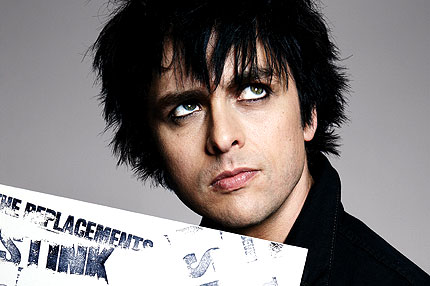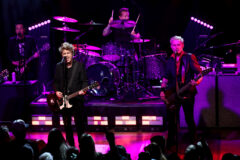Green Day and The Replacements both started out as snotty punk bands with mischievous streaks before blossoming into proper adults. The frontmen — longtime pals — talk about hero worship, staving off “creative suicide,” and realizing you’ve been singing the wrong lyric for 24 years.
SPIN: You two guys have actually known each other awhile. Do you remember when you met?
BILLIE JOE ARMSTRONG: It was during the Eventually tour. I went to see you.
SPIN: So, this is 1996, when Green Day had been huge for a couple years. Paul, were you familiar with them?
PAUL WESTERBERG: I don’t know if I heard his music before we met. I was probably too afraid to look behind me, everyone was gaining. If you’re trying to move forward, then to turn around and see 100 bands doing new things and making you look dated, you’ll think, “Why did I even start this?” If I’d thought, “Oh, the Pixies are doing that better than we are, Kurt sounds better than me on this,” it can pick your ego apart. You have to stick to your guns. I do remember you standing there and seeming out of place because you were younger and hipper than most of the people in the room. My audience was starting to mature, and when I left the Replacements, a lot of people turned their backs on me. I felt fortunate that this kid seemed to like what I was doing and wasn’t 50 years old with a day job.
ARMSTRONG: I was just coming as a fan. I was always self-conscious about our success, mostly because I want to keep evolving — I want to keep that thing moving. So I looked at Paul as being miles in front of me. You gotta understand, being a Replacements fan was a prerequisite for any girl I ever dated. So, of course I marry a girl from northeast Minneapolis — I met her on the first Green Day tour, when I was 18 years old, and I was trying to figure out which bike paths these guys rode on and where they played. And seeing a skyway for the first time and standing in front of First Avenue, I just wanted to experience that whole thing. So the first time I met Paul — I don’t know what the equivalent would be for Paul, maybe Keith Richards or Johnny Thunders — but for me, I was meeting my hero.
WESTERBERG: I felt that way meeting Keith, but even more so with Bob Dylan. We couldn’t get out of the parking lot of this studio because there was a car in the way, so we banged on the door, like, “Somebody move this fucking car!” and Bob pops his head out. So he invites me to hang out at the session while some lackey moves the car and starts playing me his new stuff as I’m shitting myself. He had Jakob with him, who wanted to meet the band. We were speechless, we didn’t know what to say, but he was a normal fucking guy.
ARMSTRONG: Being in a band, you have to be a fan first. So when you meet people who have something to say about how some song affected them, those are the people I connect with. I still am that person myself.
WESTERBERG: We can be humbled in a split second if the right person steps in the room. I rode an elevator with Pete Townshend once, and I couldn’t even muster a word. Not hello, couldn’t meet his eye.
SPIN: The biggest parallel between Green Day and the Replacements, especially at the beginnings of your careers, is probably the mix of punk and humor. Billie Joe, do you remember the first time the Replacements made an impression on you?
ARMSTRONG:A lot of my friends were into hardcore, like Minor Threat and all that, but those bands just took themselves so seriously. My sister brought me to Rasputin Records in Berkeley and gave me money to buy whatever records I wanted. I came back with this album that had, like, a guitar player and a dragon, and my sister was like, “No fucking way.”
SPIN: Was it Yngwie Malmsteen?
ARMSTRONG: I don’t want to name names. So I think I got Let It Be and Sorry Ma, Forgot to Take Out the Trash. I was 14.
WESTERBERG: Shit, that’s the perfect age.
ARMSTRONG: My kid’s 15 now; Replacements albums are the first things he reaches for. And my sister brought me to see you at the Fillmore, I think in 1987. You guys were wearing all plaid….
WESTERBERG: That could have been any night, really.
ARMSTRONG: And Tommy [Stinson] had a lime-green Rickenbacker bass. Songs like “If Only You Were Lonely,” that’s just Paul and a guitar. You never heard that in punk, and it was so vulnerable.
WESTERBERG: There were songs I didn’t really want to do for the band, that I wanted to keep for myself. But it’s a producer’s job to sit in the chair and pick out the best ones. [Late Replacements guitarist] Bob [Stinson] just wanted to get to the guitar solo, so if that wasn’t an option, he didn’t have a lot of interest. Once he wasn’t in the band anymore, it was easier to do these.
ARMSTRONG: For me, the moment was when we did Nimrod, which had “Good Riddance” — that was really the first time we attempted a ballad. The first time we ever played that song was during an encore in New Jersey — I had to pound a beer backstage to get up the courage. I knew we were gonna take a tomato to the face.
Read more of Billie Joe & Paul’s chat in the April 2010 issue of SPIN, on newsstands now.





